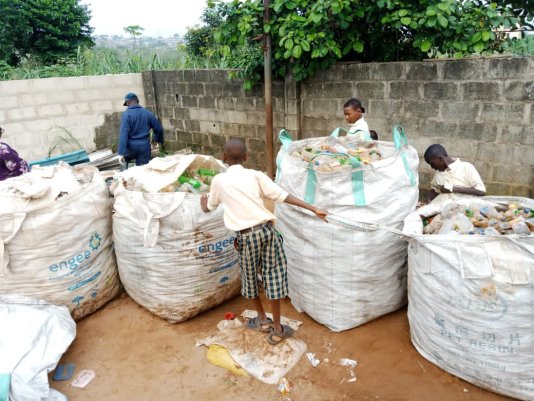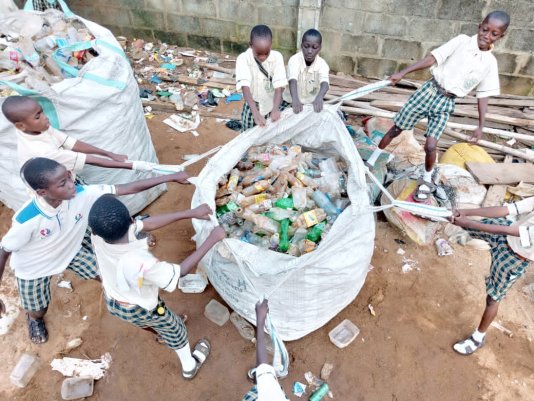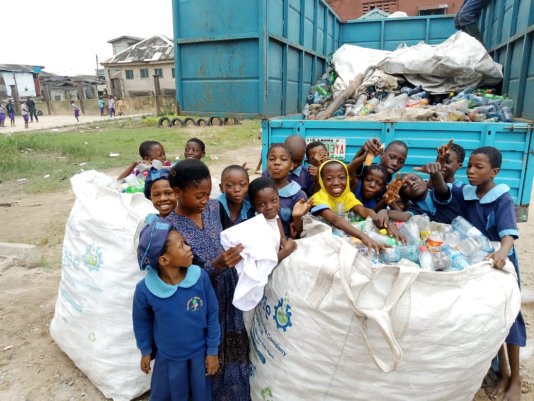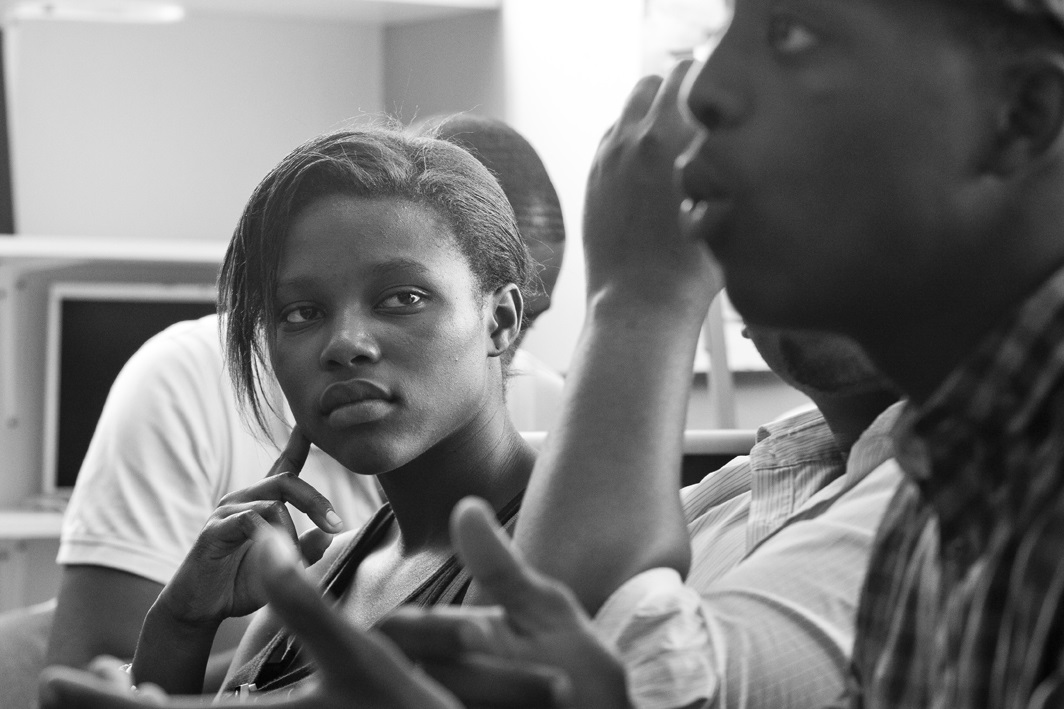- About
- Topics
- Story
- In-Depth
- Picks
- Opinion
- News
- Donate
- Signup for our newsletterOur Editors' Best Picks.Send
Read, Debate: Engage.
| October 04, 2022 | |
|---|---|
| topic: | Sustainable Development |
| tags: | #Nigeria, #education, #plastic waste, #precycling |
| located: | Nigeria |
| by: | Bob Koigi |
Each year, Nigeria’s capital Lagos generates approximately 870,000 tonnes of plastic waste. With inefficient recycling and waste management systems, a bulk of this waste ends up in water bodies, streets, landfills and beaches, causing devastating effects to the environment and human health.
At the same time, an estimated 20.2 million Nigerian children and youths do not attend school despite primary education being free and compulsory in the country.
African Clean Up Initiative, a social enterprise, has been taking action to address the two challenges.
Through an innovative project dubbed Recycles Pay, parents are allowed to collect waste, deliver it to a recycling firm and use it as payment for their children’s school fees. This has made education accessible and affordable to children studying in low-income schools.
Dr Alexander Akhigbe, the organisation’s founder, spoke to FairPlanet about the inspiration behind the project, its success in keeping children in schools while saving the environment and his future plans for the NGO.
FairPlanet: Paying school fees with recyclable waste... that's an incredibly unique approach. Where did the idea come from and how did you go about implementing it?
Dr Alexander Akhigbe: The idea of plastic waste for school fees was informed by the alarming increase in the number of out-of-school children in Nigeria in 2018, which had reached 10.5 million, coupled with the waste management menace in most underserved communities in Nigeria.
I grew up in Ajegunle , and I could relate to the problem of children not being able to go to school due to lack of school fees and growing up in communities chocking under waste.
This bothered me and I started thinking about how I could keep children in school while promoting environmental sustainability.
At the time, we were involved in a series of clean up interventions in low-income communities, but the idea of recycling had not been accepted by communities due to a lack of awareness.
I had a light bulb moment, and I thought about selling the idea of recycling and its benefit, especially in solving the school enrollment and fees problems to parents, teachers and school heads. That way, we would help solve the twin problems in the area.
I shared the idea [with an acquaintance] who owned a school in Ajegunle. We piloted the idea in the school and the outcome was impressive. That is how the Recycles Pay Educational Project came into existence.
The experience has been great so far, especially when I see children who now have the opportunity to be in school as a result of the waste they exchange for the payment of their school fees.
The amount of waste has also reduced greatly, creating a safe environment for all.
We have also been involved in education training beyond schools on the need for environmentally responsible citizenry in order to foster sustainability. My passion has been my guiding light, even when it gets tough sometimes - especially due to a lack of resources.
How severe is the waste management problem in your area?
Very serious, I would say. Most places in Lagos are plagued with the double-problem of overfilled drainages and heaps of refuse waiting to be evacuated. At the smallest drop of rain, the streets are littered with household waste materials, plastics, sachet water nylons and bottles mixed with an acrid smell from refuse heaps.
With landfills, once full, they leak and pollute groundwater and the environment. These landfills also produce unsafe gases which are a threat to our health.
How exactly does the Recycles Pay Educational Project work?
Once a school expresses interest in the project - they sign an agreement. Parents, school children and teachers are trained about recycling and the need to protect the environment.
Jumbo bags are then given to the school so that the recyclables can be properly kept. Each parent and student collect their own waste. Once the bag is full, we are informed and visit the school to weigh the waste.
The school keeps its record and we also do for transparency. The waste is then taken to a designated recycling firm that has been assigned to the school. Money is then paid directly to the school bank account.
Depending on a parent’s choice and their agreement with the school management, Recycles Pay can be used for the full or partial payment of a student’s fees. The partial payment agreement indicates that a parent pays half of the fees in cash and the rest with the waste they collect and deliver.
How has the project been received so far?
Though there is still a huge gap to fill in terms of educating and enabling the public to act on the plastic waste issue in Lagos, every day presents us with the opportunity to close this gap.
The project has received the endorsement of school owners and parents, which is proof that it is a viable project. It addresses ten sustainable development goals from responsible consumption and production, sustainable cities and communities, climate action, clean water and sanitation and good health among others.
Our mission is simple: Work for the highest good of the planet.
As you work to create grassroots solutions to local problems, what - in your view - is the role of governments and the international community in supporting such sustainable initiatives? What more should be done?
The scale of action required to solve the problem of plastic pollution should not be underestimated. Research shows that the number of plastics flowing into oceans is expected to nearly triple in volume in the next 20 years, [which would] adversely [affect] our ecosystems, health and economies.
Individuals can't solve this problem alone. The government needs to play a role in supporting sustainable initiatives. This can be done by enacting stricter policies and regulations and setting new environmental standards and certifications for energy performance, emission and pollutants.
The international community can make loans accessible and give grants for green investment to tackle environmental pollution and support the transformation of energy and industrial systems.
Governments can also help boost innovation and develop transformative technologies, such as renewable energy, waste management and carbon capture, by investing and granting funds to research institutes, academic institutions and private R&D firms.
How would you quantify your work to date in terms of impact to livelihoods and environmental conservation?
As of today, the project has been launched in 59 schools with 2,659 children benefiting directly. Over 160 schools have shown interest since [the project's] inception.
We have also been able to recover 78,225.3 kg of waste from the environment.
Many youths and women are also being given employment opportunities at the recycling firm that collects waste from schools.
How do you intend to scale the operations of the initiative?
Presently, we are getting support from individual donors who have shown commitment to the cause by either supporting a child to be in school or are supporting to help keep the project running through donations of their recyclables.
We also have organisations who are donating their waste to help support schools or keep the project running.
We also apply for grants to help scale the programme. The Coca-Cola Foundation grant, for example, helped scale the project for a year.
Image by African Clean Up Initiative.
By copying the embed code below, you agree to adhere to our republishing guidelines.



